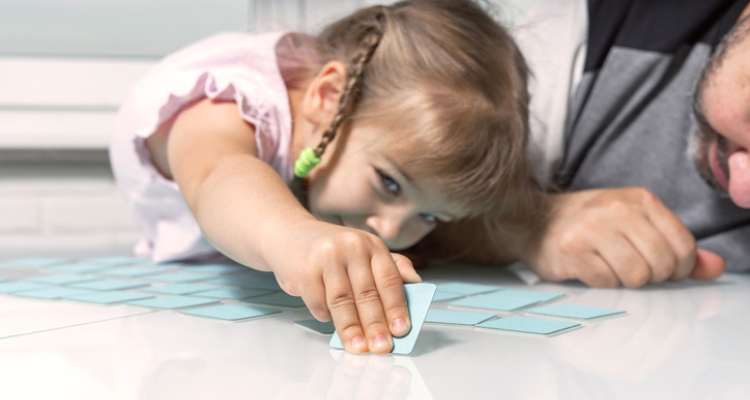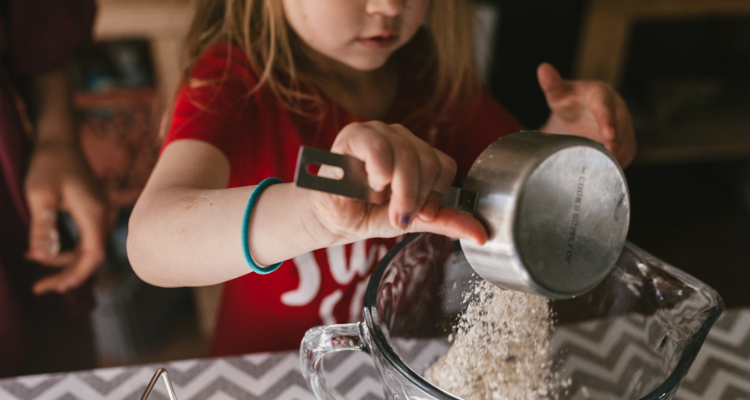
It’s never too early to start building a strong foundation for lifelong brain functioning—and games are a great way to do so! Kids tend to enjoy games, so getting started can be easy and fun.
With an increasing number of children struggling to achieve optimal attention and focus levels, it’s incredibly important to set healthy habits at an early age.*
The pediatric brain is different from an adult’s. Understanding how children develop neurologic connections and patterns helps us shape their activities and environmental exposures well before kindergarten.
Pediatric Brain Health: Factors to Consider*
The brain is the source of both physical and mental wellbeing, managing messages about environmental danger (OUCH–that’s hot!) as well as emotional stressors (Yikes–that feedback makes me sad).*
Our early childhood experiences train our brains to relax in the presence of expected stimuli in our environment and to fear or question the new and different.
Kids struggle to stay mentally focused and emotionally stable, and research has linked these modern-day challenges to factors like poor diet, lack of outdoor exercise, and more time on screens than socializing with other humans in person.*
The poor focus trend is clearly on an upward swing. In 2021, roughly 20% of children worldwide have anxious feelings on a regular basis, doubling since 2007.[1]
Inflammation is another concern. Certain microbial exposures are known to cause swelling in the brain, and many foods are shown to damage the fragile gut lining, allowing irritants to permeate and inflame the body systemically.* This plays a major role in neuropsychiatric conditions, so reducing the inflammatory response in the body is critical for long-term brain health.*
We’re asking kids’ brains to mature rapidly to keep up with the demands of ever-changing technology, but everyday stress can be harmful to their overall wellness.*To give them the best chance for a lifetime of brain health and high mental-emotional functioning, we can more intentionally shape the way they develop.*
Science tells us many brain pathways are set during early childhood, but new research in neuroscience speaks to the continued plasticity of the brain throughout our lives.[2]
In other words, it is important to help children's brains develop highly functional habits early on; however, it’s never too late to make changes and get those synapses firing optimally. Predispositions are just that—genetic suggestions, not hard realities.

How to Assess Your Child’s Brain Health: What’s Normal?
Children are designed to move around and explore their surroundings so they can learn, grow, and program their brains to manage life.
When society demands kids to sit motionless, all day, in a classroom—focusing on topics they might not be interested in at all—we begin to wonder if we’re setting them up for failure.
Many children can function within these parameters, but others struggle with impulsivity, trouble focusing, and socialization. Teachers, parents, and caregivers should be attentive and observant to determine when kids are thriving and when they could use assessment or intervention.
Educational institutions put some unnatural constraints on children. Even so, the key to their success depends on whether they can adapt and form positive behaviors for lifelong learning and functioning.
If a child struggles with sitting still in a classroom but can manage the day when allowed to hold a fidget spinner, that’s an adaptive behavior—that child’s brain can adjust to navigate life’s challenges.
On the other hand, if a child cannot complete their schoolwork regardless of trying a different chair, a different group, and flexible deadlines, it could be time for a formal assessment by a health professional. This is maladaptive behavior, but can still be helped with the right tools.
Dealing with potential issues early on can reduce frustration and start training the brain to be more adaptive before negative habits become more ingrained.
Strategies for Building a Foundation of Lifelong Brain Health*
By implementing some meaningful strategies and implementing new daily routines, we can set kids up for success from a young age. Here are some physical and mental ways to stimulate the brain and promote long-term health*:
- Unstructured play
- Reading books
- Hugging and showing affection
- Comforting others
- Time in nature
- Varying exercise routines
- Nutrient-dense brain-supporting foods
- Targeted supplements*
Kids are unique, and strategies for promoting their brain health can be, too. Make sure to incorporate movement, time outdoors, unstructured play, and plenty of time with family and friends into your child’s routine.
Foods or supplements rich in omega-3s, zinc, iron, and vitamin D are specifically shown to support healthy brain function. Research shows that adding walnuts, specifically, led to better cognitive performance and improvement in memory.*[3]
5 Memory Games for Kids
Learning and brain training can and should be fun for kids and caregivers alike! Here are five easy-to-implement ideas for activities that can help promote brain function.
- Memory/matching games. Take turns flipping the cards of images over until you’ve found all of the matching pairs.
- Reading. Stimulate the brain and enhance vocabulary with a new book for storytime.
- Simon Says. This classic game makes children pay attention closely to hear specific instructions and discern when to act on them or when not to.
- Board games. Bring out the classics like Scrabble and Boggle, which focus on finding and forming words for points.
- Word games. Get moving with fun, active games like Categories, where players have to come up with answers that all begin with the determined letter.
The tendency to bring electronics into the learning arena is contentious amongst neurologists and pediatric psychologists. Although high levels of screen time are associated with “unfavorable psychological outcomes” in children, many educational and even “brain-training” apps are targeted at kids.[4]
The consensus suggests minimizing electronic use altogether in children under five years old, and keeping it in moderation during school-age years. Screen time activates the release of feel-good hormones and stimulates the addiction portions of the brain, driving kids to want more video games and social media scrolling.
We can’t keep kids isolated from technologies used for schoolwork and in the workplace, but we do need to be mindful of their potential downsides.
Takeaway
Electronics are all around us. To adapt to our highly stimulating environments, it’s crucial to support brain health and boost cognitive function throughout our lives.
If children are allowed to spend more time holding electronic devices than playing outside, it can lead to unnecessarily challenging times in the classroom.
To enhance brain health and support cognitive function, build a foundation of nutrient-rich foods, outdoor exercise, and emotionally stable relationships with friends and family.
Make brain-boosting fun by incorporating alphabet or word-based activities, reading new books, or playing a classic memory-matching card game. It’s never too early—or too late—to set healthy habits for a lifetime of cognitive function.

[1] Benton TD, Boyd RC, Njoroge WF. Addressing the Global Crisis of Child and Adolescent Mental Health. JAMA Pediatr. 2021;175(11):1108–1110. doi:10.1001/jamapediatrics.2021.2479
[2] Power, J. D., & Schlaggar, B. L. (2017). Neural plasticity across the lifespan. Wiley interdisciplinary reviews. Developmental biology, 6(1), 10.1002/wdev.216. https://doi.org/10.1002/wdev.216
[3] Chauhan, A., & Chauhan, V. (2020). Beneficial Effects of Walnuts on Cognition and Brain Health. Nutrients, 12(2), 550. https://doi.org/10.3390/nu12020550
[4] Oswald, T. K., Rumbold, A. R., Kedzior, S. G. E., & Moore, V. M. (2020). Psychological impacts of "screen time" and "green time" for children and adolescents: A systematic scoping review. PloS one, 15(9), e0237725. https://doi.org/10.1371/journal.pone.0237725


















